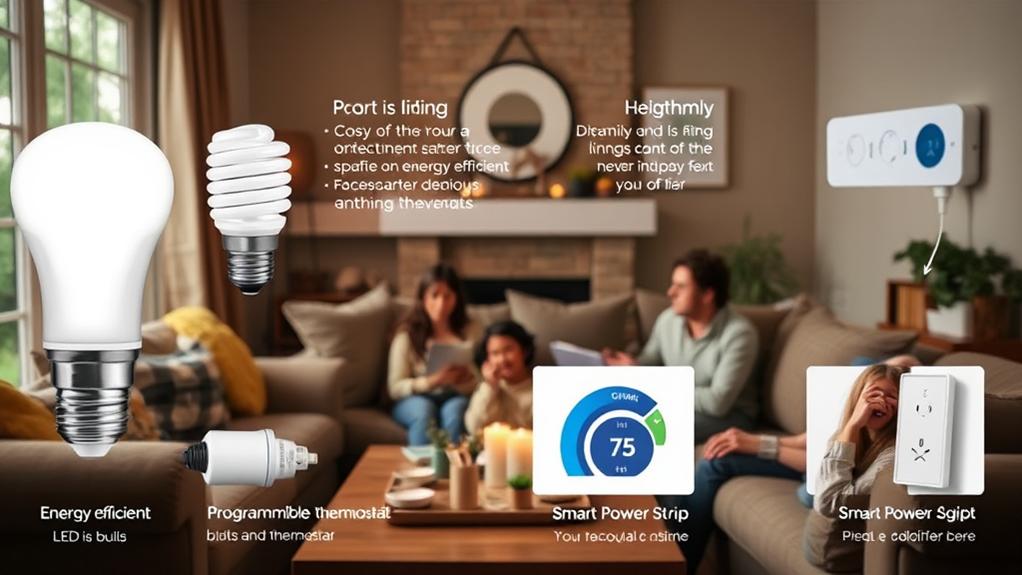Good Money Saving Tips for Everyday Expenses
You can cut everyday expenses markedly by employing a few smart strategies. Start by setting your thermostat a bit lower in winter and higher in summer; you’ll save on energy bills. Plan meals ahead and stick to a grocery list to avoid impulse buys. Use cash-back apps and loyalty programs to maximize savings at the checkout. Also, regularly review your subscriptions to eliminate unnecessary services. Automate your bill payments to avoid late fees and streamline your finances. These tips can help you save more than you think, and there’s plenty more to explore on enhancing your financial savvy.
Key Takeaways
- Plan meals and create a grocery list to reduce impulse purchases, potentially saving up to 20% on grocery bills.
- Regularly review and cancel unused subscriptions to cut unnecessary expenses and save money.
- Utilize budgeting apps to track and categorize daily expenses, making financial management easier and more efficient.
- Shop midweek for groceries to take advantage of discounts and promotions, maximizing savings on everyday purchases.
- Delay non-essential purchases to reduce impulse spending by up to 70%, helping to stick to your budget.
Energy Cost Reduction Strategies

When it comes to cutting down on energy costs, small changes can make a big difference. You can embrace freedom from high utility bills by adopting some effective energy cost reduction strategies. Start by setting your thermostat 7-10 degrees lower in winter and higher in summer. This simple adjustment can save you up to 10% on your annual heating and cooling costs, freeing up more money for what you truly enjoy.
Regular maintenance of your appliances also plays a vital role in energy efficiency. Cleaning filters and ensuring proper insulation can greatly reduce utility bills. Don’t forget to unplug devices when you’re not using them—phantom energy consumption accounts for around 10% of your home’s energy use.
Switching to energy-efficient LED bulbs is another smart move. They consume up to 75% less energy than traditional bulbs and last 25 times longer, immensely impacting your financial situation. Finally, consider scheduling energy-intensive tasks during off-peak hours to take advantage of lower energy rates, further reducing electricity costs. These money-saving tips empower you to take control of your energy expenses and enjoy a more liberated lifestyle.
Grocery Shopping Hacks
Cutting costs in one area of your budget often leads to savings in another. When it comes to grocery shopping, there are some effective hacks that can help you save money while still enjoying what you eat. Start by planning your meals in advance and creating a grocery list based on those meals. This simple step can reduce impulse purchases and potentially save you up to 20% on your grocery bill.
Consider shopping at discount grocery stores like Aldi or Costco, where you can save between 20-50% compared to traditional outlets. Buying generic brands instead of name brands can also save you around 25-30% on similar products. Don’t forget to utilize digital coupons and grocery store apps; some shoppers report saving $300 or more annually this way.
Timing your shopping trips is essential too. Aim to shop midweek, between Tuesday and Thursday, when stores often offer discounts and promotions. Implementing these grocery shopping hacks not only helps you save money but also builds your emergency fund, giving you the financial freedom you desire. Embrace these best ways to save, and watch your spending money stretch further!
Effective Budgeting Techniques

Effective budgeting techniques are vital for achieving financial stability and reaching your goals. Start by employing the 50-30-20 rule, which suggests allocating 50% of your income to needs, 30% to wants, and 20% to savings. This simple framework can help you save a lot while keeping your everyday expenses in check.
To make budgeting easier, consider using budgeting apps. These tools allow you to categorize and track daily expenses effortlessly, automating much of the budgeting process. With real-time updates, you can quickly adjust and see where your money is going.
Regularly reviewing your budget is important. Life changes, and your budget should reflect that. By revisiting your allocations, you can make necessary adjustments to maintain financial stability.
Moreover, setting specific financial goals within your budget can serve as motivation. Whether it’s saving for a vacation or paying off debt, clear goals can help reduce unnecessary spending and keep you on track.
Smart Spending Practices
Smart spending practices can greatly impact your financial health. By making informed choices, you can notably boost your savings and enjoy greater freedom in your finances. Start by creating a shopping list to avoid impulse spending, which can account for up to 40% of your grocery expenses. Stick to that list! Also, compare prices before making a purchase; you could save 10-30% by shopping around.
Here’s a quick guide on smart spending:
| Strategy | Benefit |
|---|---|
| Use money-saving apps | Save approximately $1,000 annually |
| Delay non-essential purchases | Reduce impulse spending by 70% |
| Use cash-back credit cards | Earn 1-5% on everyday purchases |
| Create a shopping list | Avoid unnecessary expenses |
Implement the 30-day rule for non-essential items; this helps you reconsider your needs. By leveraging cash-back credit cards and actively using digital coupons, you can maximize your savings. Remember, every little bit adds up. Embrace these smart spending practices to reclaim your financial freedom and make the most of your hard-earned cash!
Utilizing Loyalty Programs

Loyalty programs can be a game-changer for your budget, especially when it comes to grocery shopping. By joining these programs, you gain access to exclusive discounts that can add up to hundreds of dollars in savings each year. You’ll also have the chance to accumulate points with every purchase, which means you’re not just spending money; you’re building a stash to redeem on future shopping trips.
Don’t forget to sign up for store newsletters linked to these programs. They often provide additional coupons and promotional offers, enhancing your savings opportunities. Keep an eye out for bonus point promotions during special sales events or holidays, as these can greatly boost your rewards.
Loyalty programs can also tailor personalized deals based on your shopping habits. This means you can make more informed and cost-effective decisions, saving you time and money on your regular shopping expenses. So, take full advantage of these programs and enjoy the freedom that comes with knowing you’re maximizing every dollar spent. Embrace the benefits of loyalty programs, and watch your savings grow!
Managing Subscriptions Wisely
Managing your subscriptions wisely can greatly impact your budget. Regularly reviewing your subscriptions helps you identify those you rarely use. Canceling just one can lead to substantial savings over time. Opt for annual payment plans for frequently used services, as they often help you save money compared to monthly fees. Sharing streaming accounts with family or friends is another smart move to maximize value and keep extra cash in your pocket.
To keep track of your subscriptions and avoid unexpected charges, consider using budgeting apps. These tools can remind you when payments are due, helping maintain financial awareness. Here’s a quick reference table to illustrate potential savings:
| Subscription Type | Monthly Cost | Annual Cost | Savings |
|---|---|---|---|
| Streaming Service A | $15 | $120 | $60 |
| Music Streaming | $10 | $90 | $30 |
| Fitness App | $20 | $180 | $60 |
| Online Learning Platform | $25 | $240 | $60 |
| Gaming Subscription | $15 | $120 | $60 |
Automating Bill Payments

Automating your bill payments can be a game changer for your financial routine. By setting up automatic payments for your recurring bills, you guarantee timely payments that reduce late fees, which can average around $30-35 per missed payment. This consistency not only saves you money but can also improve your credit score by maintaining a solid payment history, a vital factor in credit scoring.
Most banks and service providers offer the option to automate these payments, allowing you to align them with your income schedule for better cash flow management. Plus, regularly reviewing your automated payments helps you identify any unnecessary subscriptions or services you might be paying for, giving you the chance to cut back and save even more.
Automating your bills can save you time, freeing up an average of 10 hours a year spent on manual bill management. This extra time can be redirected toward other aspects of your financial planning, allowing you to focus on what truly matters to you. Embrace automation and enjoy the peace of mind that comes with streamlined finances and newfound freedom.
Exploring Cash-Back Opportunities
After streamlining your bill payments, it’s time to explore more ways to save money, starting with cash-back opportunities. By taking advantage of cash-back credit cards and apps, you can turn your everyday purchases into savings. Here’s how to get started:
- Cash-Back Credit Cards: Choose a card that offers up to 5% cash back in categories like groceries or gas. This can lead to considerable savings over time, especially if you’re diligent about using it for those purchases.
- Cash-Back Apps: Utilize apps like Rakuten or Ibotta to earn cash back. Simply scan your receipts or link your store accounts. Many users save hundreds annually without any extra effort.
- Loyalty Programs: Join grocery stores’ loyalty programs that include cash-back options. Accumulate points for discounts or cash rewards, giving you even more ways to maximize savings.
Don’t forget to check for bonuses when signing up or referring friends. These small efforts can enhance your cash-back potential considerably. By exploring these opportunities, you’re on your way to saving money effortlessly!
Enhancing Financial Awareness

Enhancing your financial awareness is essential for making informed decisions that can considerably impact your savings and overall financial health. By regularly reviewing your financial statements, you can identify unnecessary fees and subscriptions that might be draining your budget, potentially saving you hundreds of dollars annually.
Utilizing budgeting apps can also greatly enhance your financial awareness by helping you categorize expenses and track your spending habits. This makes it easier to pinpoint areas for improvement and adjust accordingly. Understanding the implications of your financial decisions, like interest rates on loans, can lead to better long-term outcomes and increased savings.
Engaging in financial literacy education empowers you to make informed decisions about savings, investments, and debt management. This knowledge ultimately improves your financial stability and gives you the freedom to reach your goals. Setting specific financial goals and regularly evaluating your progress can motivate you to save more effectively and refine your spending habits.
Frequently Asked Questions
How to Save Money on Daily Living Expenses?
Think of your budget as a garden; nurture it wisely. Plan meals, embrace cashback apps, trim unused subscriptions, and buy in bulk. These steps will free your finances, letting your savings flourish and grow.
How to Save How to Save $1,000 in 30 Days?,000 in 30 Days?
To save $1,000 in 30 days, start by saving $1 daily, increasing by $1. Cut non-essentials, meal prep, use cashback apps, and track spending to identify savings opportunities. Stay motivated!
How to Save Money on Everyday Purchases?
Did you know that shoppers can overspend by 23% without a list? You can save money on everyday purchases by using digital coupons, loyalty programs, and cash-back cards, while also delaying non-essential buys.
What Is the 30 Day Rule?
The 30 Day Rule encourages you to wait 30 days before buying non-essentials. This pause helps you reflect on needs versus wants, reducing impulse purchases and fostering mindful spending, ultimately enhancing your financial freedom.







